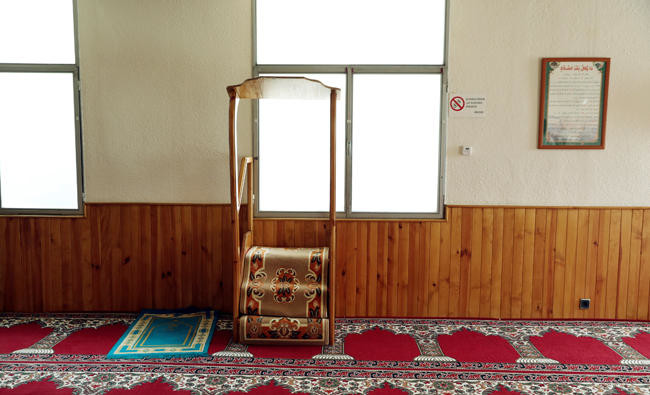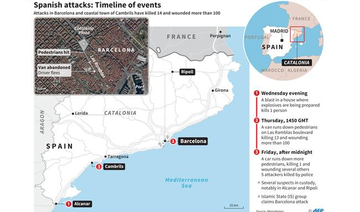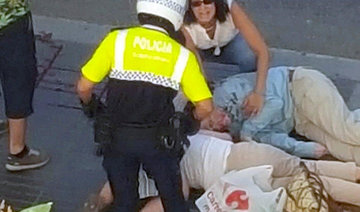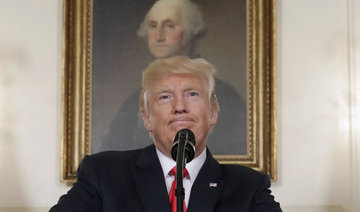RIPOLL, Spain: A missing imam and a house that exploded days ago became the focus Saturday of the investigation into an extremist cell responsible for two deadly attacks in Barcelona and a nearby resort, as authorities narrowed in on who radicalized a group of young men in northeastern Spain.
Investigators searched the home of Abdelbaki Es Satty, an imam who in June abruptly quit working at a mosque in the town of Ripoll, the home of the Islamic radicals behind the attacks that killed 14 people and wounded over 120 in the last few days. Police were trying to determine whether Es Satty was killed in a botched bomb-making operation on Wednesday, the eve of the Barcelona bloodshed.
His former mosque has denounced the deadly attacks and weeping relatives marched into a Ripoll square on Saturday, tearfully denying any knowledge of the radical plans of their sons and brothers. At least one of the suspects is still on the run, and his younger brother has disappeared, as has the younger brother of one of the five attackers slain Friday by police.
Catalan police said a manhunt was centered on Younes Abouyaaquoub, a 22-year-old Moroccan suspected of driving the van that plowed into a packed Barcelona promenade Thursday, killing 13 people and injuring 120. Another attack early Friday killed one person and wounded five in the resort of Cambrils.
The Daesh group has claimed responsibility for both.
Everyone so far known in the cell grew up in Ripoll, a town in the Catalan foothills near the French border 100 kilometers (62 miles) north of Barcelona. Spanish police searched nine homes in Ripoll, including Es Satty’s, and two buses, and set up a roadblock that checked each car entering the town. Across the Pyrenees, French police carried out extra border checks on people coming in from Spain.
Neighbors, family and even the mayor of Ripoll said they were shocked by news of the alleged involvement of the young men, whom all described as integrated Spanish and Catalan speakers with friends of all backgrounds.
Halima Hychami, the weeping mother of Mohamed Hychami, one of the attackers named by police, said he told her he was leaving on vacation and would return Aug. 25. His younger brother, Omar, slept late Thursday and left mid-afternoon.
Mohamed Hychami is believed among the five attackers shot to death by police in Cambrils. She hasn’t heard from Omar since he left.
“We found out by watching TV, same as all of you. They never talked about the imam. They were normal boys. They took care of me, booked my flight when I went on vacation. They all had jobs. They didn’t steal. Never had a problem with me or anybody else. I can’t understand it,” she said.
Even with Abouyaaquoub at large, Spanish Interior Minister Juan Ignacio Zoido declared the cell “broken” Saturday. In addition to the five killed by police, four were in custody and one or two were killed in a house explosion Wednesday. He said there was no new imminent threat of attack.
Police also conducted a series of controlled explosions Saturday in the town of Alcanar, south of Barcelona, where the attacks were planned in house that was destroyed Wednesday by an explosion. Authorities had initially thought it was a gas accident, but took another look after the attacks.
Initially, only one person was believed killed in the Wednesday blast. But officials said DNA tests were underway to determine if human remains found there Friday were from a second victim. A police official, speaking on condition of anonymity to discuss the ongoing searches, said investigators believed the remains may belong to Es Satty.
The official said investigators also discovered ingredients of the explosive TATP, used by the Daesh group in attacks in Paris and Brussels, as well as multiple butane tanks that the group may have wanted to combine with the homemade explosive and load into their vehicles.
Neighbors on Saturday said they had seen three vehicles coming and going from the home, including an Audi used in the Cambrils attack and the van used in the Barcelona attack.
The president of the mosque where Es Satty preached, Ali Yassine, said he hadn’t seen him since June, when he announced he was returning to Morocco for three months.
“He left the same way he came,” said a bitter Wafa Marsi, a friend to many of the attackers, who appeared Saturday alongside their families to denounce terrorism.
Members of Ripoll’s Muslim community denounced the vehicle attacks and offered their sympathy to the families of the victims.
Authorities said the two attacks were the work of a large terrorist cell that had been plotting for a long time from the house in Alcanar, 200 kilometers (125 miles) down the coast from Barcelona.
The lone named suspect still at large, Abouyaaquoub, figures on a police list of four main suspects sought in the attacks. Also on the list is 17-year-old Moussa Oukabir, whose brother Driss reported to police that his documents stolen. Ripoll’s mayor confirmed that those documents were found in a vehicle used in the attacks. Moussa was one of the five radicals killed, and Driss is in custody, police said.
Catalan regional police said they are mounting major road blocks throughout the northeastern region, warning people they may encounter traffic jams on different roads.
A French police official said authorities were also looking for a Kangoo utility vehicle that was believed to have been rented in Spain by a suspect in the Barcelona attack that might have crossed the border.
Fatima Abouyaaquoub, sister-in-law of the Hychami brothers and the cousin of Younes Abouyaaquoub, said she found it all hard to believe.
“I’m still waiting for all of it to be a lie. I don’t know if they were brainwashed or they gave them some type of medication or what. I can’t explain it,” she said.
Abouyaaquoub’s mother said his younger brother, Hussein, left home Thursday afternoon and hasn’t returned.
The sheer size of the cell and the close family relations among the attackers recalled the November 2015 attacks in Paris, in which Islamic State attackers struck the national stadium, a Paris concert hall and bars and restaurants nearly simultaneously, leaving 130 people dead. Since then, the extremist group has steadily lost ground in its self-declared caliphate in Iraq and Syria.
Islamic extremists have made a point of targeting Europe’s major tourist attractions in recent years — especially in rented or hijacked vehicles.
Yet Spain decided to keep its terrorist threat alert at level 4 — out of five — declaring Saturday that no new attacks were imminent. Zoido said the country would reinforce security for events that draw large crowds as well as at popular tourist sites.
The dead and wounded in the two attacks came from 34 countries. By late Saturday, the Catalan emergency service said 53 people remained hospitalized, 13 of them in critical condition.
The 14 people killed spanned generations — from age 3 to age 80 — and left behind devastated loved ones. They included a grandmother, 74, and her granddaughter, 20, from Portugal who were visiting Barcelona to celebrate a birthday; an Italian father who saved his children’s lives but lost his own; an American man who was celebrating his first wedding anniversary in vibrant Barcelona.
Francisco Lopez Rodriguez, a 57-year-old Spaniard, was killed with his 3-year-old grand-nephew, Javier Martinez, while walking along the Las Ramblas promenade. His widow Roser is recovering from her wounds in a hospital.
“We are a broken family,” niece Raquel Baron Lopez posted on Twitter.
Spain investigates missing imam, mysterious explosion
Spain investigates missing imam, mysterious explosion

Ukrainian hit on occupied southern village kills 3: Moscow-installed official
“At the moment, we know about three killed civilians”
MOSCOW: Russian occupational authorities in southern Ukraine said Saturday that a Ukrainian strike on a Moscow-held village in the Kherson region killed three people.
Vladimir Saldo, the Moscow-installed leader of the Russian-occupied part of Ukraine’s Kherson region, accused Kyiv of using cluster munitions in a strike on the village of Oleshky.
Oleshky lies close to the city of Kherson and near the Dnipro river, which forms the frontline in southern Ukraine.
“Ukrainian terrorists shelled Oleshky with cluster munitions and remote mine-clearing systems,” Saldo said in a post on Telegram.
“At the moment, we know about three killed civilians,” he added, saying the victims are being identified.
He called on villagers to stay in their homes or in shelters.
Both sides in the almost three-year war have accused each other of using cluster munitions.
The US has supplied cluster munitions — which rights groups say are particularly deadly and have long-term effects — drawing criticism even from its allies.
Kyiv, meanwhile, said that four people were wounded by Russian attacks in the Kherson region on Saturday.
Seoul court rejects second request to extend Yoon detention

- Yoon Suk Yeol was arrested last week on insurrection charges
- Becomes first sitting South Korean head of state to be detained in a criminal probe
SEOUL: A Seoul court rejected a second request Saturday to extend the detention of impeached President Yoon Suk Yeol over his failed attempt to declare martial law, putting pressure on prosecutors to quickly indict him.
Yoon was arrested last week on insurrection charges, becoming the first sitting South Korean head of state to be detained in a criminal probe.
His December 3 martial law decree only lasted about six hours before it was voted down by lawmakers, but it still managed to plunge South Korea into its worst political crisis in decades.
The Seoul Central District Court on Saturday turned down a request for a detention extension, prosecutors said in a brief statement.
This follows a ruling by the same court a day earlier when a judge stated it was “difficult to find sufficient grounds” to grant an extension.
Prosecutors had planned to keep the disgraced leader in custody until February 6 for questioning before formally indicting him, but that plan will now need to be adjusted.
“With the court’s rejection of the extension, prosecutors must now work quickly to formally indict Yoon to keep him behind bars,” Yoo Jung-hoon, an attorney and political commentator, said.
Yoon has refused to cooperate with the criminal probe, with his legal defense team arguing investigators lack legal authority.
The suspended president is also facing a separate hearing in the Constitutional Court which, if it upholds his impeachment, would officially remove him from office.
An election would then have to be held within 60 days.
Kabul residents name their newest mosque after Gaza

- Gaza Mosque is located in Qua-ye-Markaz, near Kabul’s famous carpet market
- Opened this month, the two-story mosque was funded from public donations
KABUL: In an act of solidarity and to honor the victims of Israel’s war on Gaza, residents of the Afghan capital have named their newest mosque after the Palestinian enclave.
Opened on Jan. 11, the Gaza Mosque is located in the Qua-ye-Markaz area of Kabul, close to business plazas and the city’s famous carpet market.
A two-story building, which can accommodate some 500 worshippers, it was funded from public donations on land provided by the Kabul municipality.
“The mosque was named Gaza Mosque to acknowledge the struggle and sacrifices of the men, women, children, youth and elders in Gaza in defending their land,” Hajji Habibudin Rezayi, a businessman who led the fundraising, told Arab News.
“There were a few name suggestions before the completion of the mosque’s construction, including Palestine, Aqsa and Gaza. Most of the campaign participants voted for Gaza as a symbol of solidarity.”
There is widespread support for Palestine among Afghans — many of whom know what it means to live under foreign occupation as they endured it during the 1979-1989 Soviet-Afghan War and the 20 years of war following the US invasion in 2001.
Afghanistan was the first non-Arab country to recognize the Palestinian National Council’s declaration of independence in 1948. Every successive Afghan government has stood by Palestine in the wake of Israel’s wars against it and the occupation of Palestinian land.
Since the beginning of Israel’s latest deadly assault on Gaza in October 2023, which has destroyed most of the enclave’s civilian infrastructure and killed tens of thousands of civilians, imams at Afghan mosques have regularly held special prayers for Palestinian freedom.
When a ceasefire was announced last week, celebrations were organized both in Afghan households and in public spaces.
“Afghans have been trying to help as much as they can to send support to Palestinians in terms of donations, prayers and other acts of solidarity,” said Abduraqib Hakimi, the imam of the Gaza Mosque.
“Every Muslim and human must have some solidarity with the people of Palestine and Gaza for what they have gone through during the past year and a half.”
Worshipers at the mosque told Arab News that they hoped that their country could do more.
“Israel’s actions in Palestine are nothing but genocide,” one of them, Asadullah Dayi, said.
“Innocent women and children were killed, and houses were destroyed. There has never been so much oppression in the history of Islam like the Zionist oppression of the Palestinians.”
Three years after restoring ties, Thailand sees growth in exchanges with Saudi Arabia

- Last week, Saudi FM led Kingdom’s delegation at inaugural meeting of Saudi-Thai Coordination Council
- With increase in trade relations, Thai Board of Investment opened an office in Riyadh in July last year
Bangkok: Three years into the reestablishment of ties with Saudi Arabia, Thais say that they are observing new opportunities and the growth of relations.
Relations between Saudi Arabia and Thailand were officially restored in January 2022, during Thailand’s former prime minister Prayut Chan-o-cha’s visit to Riyadh, when the two countries agreed to appoint ambassadors for the first time in more than three decades.
The visit was reciprocated in November that year, when Saudi Crown Prince Mohammed bin Salman arrived in Bangkok as a guest of honor at the Asia-Pacific Economic Cooperation summit and became the first Saudi official to make such a trip.
Many agreements and official exchanges have since followed. Not only the volume of trade between the two countries has significantly increased, but also people-to-people exchanges and political consultations.
The ties were further solidified last week, when Saudi Foreign Minister Prince Faisal bin Farhan visited Thailand, leading the Kingdom’s delegation at the inaugural meeting of the Saudi-Thai Coordination Council. The meeting drove further bilateral cooperation in politics, consular affairs, security and military ties, culture, tourism, economy and trade.
Alhuda Chanitphattana, a Middle East expert from Bangkok University, told Arab News that while over the past three years there has been significant growth in various industries, especially tourism and cooperation between small and medium-sized enterprises, last week’s visit marked another milestone in relations.
“The Jan. 16 meeting was a hopeful step in the history of our ties,” she said.
“The Saudi foreign minister was here himself, bringing along the press, and the meeting was able to set up a number of significant collaborations.”
The Tourism Authority of Thailand estimated that since the restoration of ties, the number of Saudis visiting the Southeast Asian nation has risen threefold, as it expected 300,000 Saudi travelers in 2025.
Since the resumption of diplomatic relations in 2022, bilateral trade has grown by more than 30 percent, surpassing $7 billion. Key Thai exports include automobiles, wood products and canned seafood, while Saudi Arabia primarily exports crude oil, chemicals and fertilizers to Thailand.
The upside is seen especially in the automobile sector.
“Thailand’s car and car parts export to Saudi Arabia grew by 40-50 percent in the past year due to more demand in the Kingdom,” Chanitphattana said. “Thai mechanics are in high demand now.”
The establishment of a Thailand Board of Investment office in Riyadh in July 2024 has also underscored the country’s commitment to supporting Saudi Vision 2030 and attracting investors from the Kingdom.
“There was a Thai exporter of essential oils who was earlier based in Dubai, but after 2022, he moved to Riyadh and opened an office in King Abdullah Financial District,” Chanitphattana said, adding that the Thai Chamber of Commerce is open to helping other businesses match with Saudi counterparts.
One such entrepreneur is Manoj Atmaramani, who in 2022 was among the first Thais to join a hotel, restaurant and cafe/catering event in Saudi Arabia.
That visit bore fruit. Today, Atmaramani exports tea and coffee products to the Kingdom and his business is growing.
“Now Saudi people can travel here, and Thai people can travel there. I have taken many Saudi businesspeople to my factory. I have also visited coffee factories in Saudi Arabia. I would advise the Thai businesspeople to present themselves at the business exhibitions in Saudi Arabia,” he said.
“Saudi Arabia is my first export market outside of Southeast Asia. My product lines have expanded since.”
South Korea to release preliminary report of Jeju Air crash by Monday

- One area under investigation is what role a bird strike played in the Dec. 29 crash of flight 7C2216
- It will take several months to analyze and verify flight data and cockpit voice recordings
SEOUL: South Korea will release by Monday a preliminary report on last month’s Jeju Air plane crash that killed 179 people, the deadliest air disaster on the nation’s soil, the transport ministry said on Saturday.
One area under investigation is what role a bird strike played in the Dec. 29 crash of flight 7C2216 as it arrived at Muan International Airport from Bangkok, according to a ministry statement.
The report will be sent to the International Civil Aviation Organization as well as the United States, France and Thailand, the ministry said. Seoul has been cooperating with investigators from the US National Transportation Safety Board and France’s Bureau of Enquiry and Analysis for Civil Aviation Safety.
It will take several months to analyze and verify flight data and cockpit voice recordings, which stopped recording four minutes and seven seconds before the crash, and communication recordings with the control tower, the ministry said.
At 08:58:11 a.m., the pilots discussed birds flying under the Boeing 737-800, then declared mayday at 08:58:56, reporting a bird strike while the plane was on a go-around, the statement said. Airport CCTV footage also showed the plane making “contact” with birds during the go-around, it said.
Previously the ministry had said the pilots issued the distress signal due to bird strikes before going around.
The jet crashed at 9:02:57 a.m., slamming into an embankment and bursting into flames that killed everyone aboard except for two crew members in the tail section.
The surveillance footage was taken from too far away to see if there was a spark from the bird strike but it “confirmed the plane making contact with birds, though the exact time is unclear,” a ministry official told Reuters.
Duck feathers and blood were found in both of the plane’s GE Aerospace engines, the ministry said.
The ministry said it would conduct a separate analysis of the role of the concrete embankment that supported navigation antennas called “localizers.” The ministry said on Wednesday that it would remove the embankment, which experts said likely made the disaster more deadly.




















